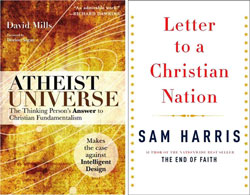Do we Christians cry “Miracle!” too much? David Mills, an atheist, thinks so.
When a doctor gives someone 6 months to live, and he ends up making it 8 months, or a year–is that necessarily a miracle? Or could it be that predicting when a person will die is not an exact science? Or that doctors habitually underplay things, not wanting to say you have a year to live, and then you die in six months? Or could it be that it was the skill of doctors that extended the person’s life?
When a tornado rips through a town and kills a dozen people, you’ll hear survivors say things like, “God miraculously spared me.” Is that an accurate statement? Was it God that killed those 12 people? If so, why did he kill them but spare others? Did he send the tornado, or did it merely result from well-known weather conditions? Was God really directing the tornado’s path?
In “Atheist Universe,” Mills points out that we rig the system, so that we can claim divine intervention no matter how something turns out. If we pray for someone to get well, and they do–it’s a miracle. If they don’t get well, we accept it as “God’s will” or say, “It was simply his time to go.” We never say, “God ignored my prayers.” In fact, we often say that when God doesn’t answer our prayers, that that was his answer.
How does that look to nonChristians?
I occasionally look at the website ExChristian.net, where people who have forsaken Christianity tell their stories. I’ve read a couple posts where atheists told of coincidences happening to their advantage, or people getting well when they weren’t expected to. They say, “If I were still a Christian, I’d say it was a miracle. But since I don’t believe in God, I recognize it for what it was: that’s just the way things worked out.”
I’ve seen people claim divine intervention for some of the silliest little things, like leading a person to the fastest line at the bank because God knew he was in a hurry. People love assembling a string of coincidences into a miracle. I’ve done it. A person sings a nice solo in church, and then says, “I couldn’t have done that without God’s help.” Even though she’s been singing solos for years.
Consider how this looks to nonChristians.
Now, I totally believe in God’s sovereignty, and I believe he’s active in human affairs. I believe he answers prayers and that he brings healing. I believe that he engineers coincidences to make good things happen for us. I believe that, just because our statements may sometimes sound trite, that doesn’t make them inaccurate. And yet–do we overdo it?
Mills writes, “We reserve our use of the term ‘miracle’ to describe only those events that we personally consider positive.” So if you survive a car crash but another passenger is seriously injured, you’re more likely to claim divine intervention than the other person. “If we like the outcome, it’s much easier to see the event as a miracle….We are therefore highly biased in favor of seeing miracles.”
He’s got a point.
On any day of the week, there will be many people who would normally be at the Empire State Building, but who won’t be. Maybe they had a doctor’s appointment, or got sick, or decided to take an impromptu vacation day, or had a late breakfast meeting somewhere. So if a meteor obliterates the building tomorrow, all of those people could claim that God intervened to spare them. But the week before, a similar number of people had doctor’s appointments, got sick, and took vacation days, but since no meteor hit, nobody talks about divine intervention.
We American Christians, in our obsession with health, constantly claim miracles happened regarding whatever our health problem is, no matter how big or small it is. Sometimes, should the credit just go to skilled doctors? What about people who die of these same ailments in Third World countries, where they don’t have access to medical care? Does God prefer to do miracles in hospitals?
Mills writes, “Witnessing ‘miracles’ does not evoke belief in God. Rather, belief in God evokes the witnessing of ‘miracles.'” I think this is true when we are quick to see miracles in the truly trivial, banal things of life.
It sounds like I’m raising questions about my faith. I’m not. I’m really not. I’m just trying to understand how skeptics, looking at us from the outside, view us. And I’m trying to understand what is and isn’t true about the God I serve. Because that’s what it’s all about–knowing God, even if it goes against what our Christian culture teaches us. It’s quite possible that many times, God is saying, “Hey, don’t give me credit for that. I didn’t have anything to do with it.”
Or, maybe I should leave theological questions like this to the professionals.


 Surveys show that atheism and agnosticism are on the rise in the United States. Christianity is ascendant in other parts of the world, particularly Latin America and Africa, but not in Western countries. I don’t know why. But I decided to try to understand better how atheists see the world and view Christianity.
Surveys show that atheism and agnosticism are on the rise in the United States. Christianity is ascendant in other parts of the world, particularly Latin America and Africa, but not in Western countries. I don’t know why. But I decided to try to understand better how atheists see the world and view Christianity. 
 I’m a little behind on reviewing books I’ve read. Here are three recent novels.
I’m a little behind on reviewing books I’ve read. Here are three recent novels.


